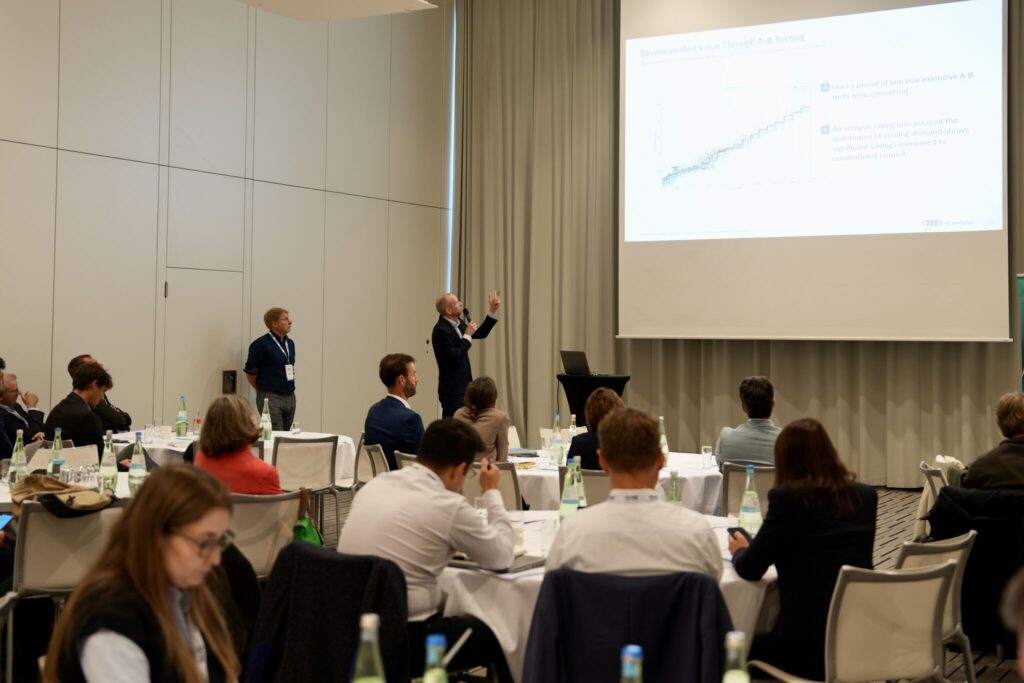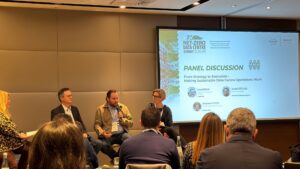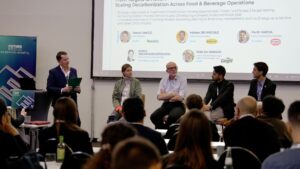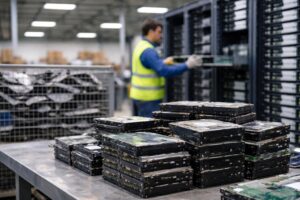The 2nd Industrial Energy Management Summit hosted senior industry decision-makers in Berlin. Over two days, these major energy consumers went through a plethora of insights straight from experience through sessions, panel discussions, case studies, and more. Moreover, the incredible/ dedicated networking opportunities made sure that each professional uncovered potential collaboration opportunities, expanded perspectives, strengthened visibility in the community, and refined ideas going forward. This article serves as a recap of the uniqueness/value this summit offered. It will also give you an idea as to what attendance at these summits can offer you as a professional. So, let’s get going.
Sessions at the 2nd Industrial Energy Management Summit
The program formed the core of the summit, presenting a strong transfer of insight and opinion. We discussed everything from top-level EU policy analysis to utilitarian, leading-edge industrial technologies poised for implementation. Participants also gained value from multiple viewpoints, which generated essential takeaways on the primary issues shaping new energy management. So, let’s dive into these sessions:
The massive potential of EU policies
Speaker: Ole LØFSNÆS, Nordic Energy Director, Alcoa
The speaker began by openly recognizing the present poor industrial competitiveness of the European Union, a top issue for all those in the audience. In answer to such a challenge, the speaker created a reassuring frame: ambitious climate action truly does have the potential to be a fantastic driver for good economic growth and industrial renaissance. So, this fundamentally shifts the framing, taking climate action away from something burdensome towards something that is a required enabler.
The speaker also critically examined the current EU policy context, particularly describing why current policies that exist are not adequate in terms of driving the needed transformation. Yet, the session provided a good, hopeful closing, i.e, anticipated/ future policies have the enormous potential necessary. This is to effectively reorganize the industrial base and deliver on both climate change objectives and required growth.
Energy Management: Key to competitiveness by unlocking existing and new flexibilities
Speaker: Dr. Rainer SALIGER, Principal Key Expert Energy Storage, Siemens
The presenter rapidly set the essential position of energy management as a prime driver for industrial competitiveness, maintenance, & improvement. We understood that it is done effectively by opening up existing and new system flexibilities in a firm’s activities. The presentation elaborated on the variety of existing and sophisticated Energy Management Systems (EMS) in use today. These constitute the technical basis for new flexibility approaches.
In addition, the presenter delved into the different market drivers currently actively encouraging flexibility on the demand side. This gave a robust financial argument for these operational changes. Moreover, the session dwelt on the business models and boundary conditions required to effectively engage in flexibility markets. There was also a presentation of real-world applications of businesses drawing upon existing flexibilities and installing new storage systems within advanced multi-use models.
Using energy as a strategic lever for decarbonization: Lessons and insights from Kautex Textron
Speaker: Sophie LOUIS, Energy and Sustainability Global Director, Kautex Textron
The presenter demonstrated the strategic and holistic manner in which their corporation leverages different sources of energy as an influential driver to propel its corporate decarbonization path. Furthermore, the presentation focused on Scope 1 emissions. The speaker cited KEMAP as being successful, as well as other company internal programs, having the aim of minimizing direct emissions from the company’s core activities.
Following the discussion of Scope 1, the presentation referred to Scope 2 emission reduction opportunities. This time, highlighting virtual Power Purchase Agreements (vPPA) as one of the most significant contributors to reductions in indirect emissions from purchased electricity. Commitment to Scope 3 was also discussed by the speaker in a plan for how to engage suppliers. The key concept of the proposal was large-scale supplier training, as well as encouraging them to base their businesses on green electricity. This is particularly through the use of the Procure2CO2 project. Additionally, this is a clear vision of sustainability transformation
Energy Centre of Excellence. The organization responsible for delivering results and accelerating best practices
Speaker: Michele ELEUTERI, Global Energy CoE Lead, Bunge
The Energy Centre of Excellence (CoE) session discussed its critical function in the delivery of measurable performance and best practices dissemination throughout the organization. It highlighted how the CoE serves as the beacon driving energy management efforts, pushing efficiency and sustainability objectives while guiding the firm through the international energy transformation. The presenter at the 2nd Industrial Energy Management Summit elaborated on how this centralized strategy allows energy strategies not only to be effective but also reproducible across a large number of regions and business units.
The other prominent area of emphasis during the session was the role of the CoE to standardize technologies and processes. This builds alignment between departments. Standardization allows:
- Constant performance,
- Enhances coordination,
- And facilitates easy adoption of innovative technologies.
The session also put light on the role of the CoE in developing operational know-how & building a learning organization. One that captures experience, distributes knowledge, and continuously improves energy performance throughout the enterprise.
Moving beyond energy efficiency. Towards integrated, flexible energy cost management in the age of renewables
Speaker: Thomas VYNCKE, Co-founder, Companion.energy
The speaker laid out the novel approach and urged the audience to abandon the conventional method of energy efficiency and take on a more comprehensive and flexible method for energy cost management, particularly in an era characterized by a rapid increase in the use of renewables. The topic was how companies can nearly cut energy costs and handle the financial risks resulting from the energy market becoming extremely volatile due to the various renewable energy resources.
Moreover, the speaker explained how companies could close the gap between achieving serious financial savings and contributing to the global sustainability agenda. A key element involved looking for the hidden flexibilities that are usually ignored in the complex industrial processes. Additionally, the speaker explained that an organization can use this flexibility for monetization through better energy sourcing and market optimization. The focus was on the importance of proactive cooperation with energy suppliers so that you receive win-win contracts.
Diversification of electricity buying strategies based on geography within the European Union
Speaker: Jakub KARASIEWICZ, Business Developer, Renewable Energy in the Category Area Indirect Procurement, Inter IKEA
This presentation discussed in great detail the need for diversifying one’s electricity buying strategies. It is a factor that is largely influenced by the location within the European Union. For major companies that are present in different countries of the EU, the energy sector presents different regulations, local energy mix compositions, and contractual opportunities.
The speaker pointed out how a successful procurement strategy must not be a one-size-fits-all approach but rather must be adaptable. Such diversification entails:
- Reviewing the regulatory landscape at the local level,
- Knowing the easily available renewable energy resources in that particular geography,
- And then structuring purchasing agreements in a strategic manner.
It maximizes financial savings and overall sustainability value across the entire portfolio.
Energy management for competitiveness and resilience
Speaker: Vida ROZITE, Energy Analyst, International Energy Agency – IEA
The IEA energy analyst outlined the major benefits of an energy management plan, saying it is a win-win policy. It not only increases industrial competitiveness but also plays a major role in building up the operational resistance level. The talk at the 2nd Industrial Energy Management Summit dealt with current trends in energy intensity and energy efficiency investment.
The presenter really pushed energy-efficient behavior, not just to the financial bottom line but also to overall plant stability. In addition, the conversation touched on the vital subject of industrial electrification and its associated effects on current electrical grids. The speaker ended with a thrilling glimpse into the future in which there was a highlight on the game-changing role of Artificial Intelligence (AI) as a tool to catalyze and maintain profound industrial energy efficiency improvements.

Circular Thermal �� – Efficiently integrating high-temperature heat pumps in industrial processes
Speaker: Rossen IVANOV, Managing Director, EMEA, Armstrong International EMEA
The presenter provided the groundbreaking idea of Circular Thermal®, a technique carefully developed to effectively incorporate high-temperature heat pumps into industrial processes. The workshop sought to demonstrate how to retrofit the traditionally inefficient “one-way” industrial thermal systems, particularly those common in light industries that need temperatures less than 200°C (e.g., food, beverage, pharma).
The fundamental promise of the method is to markedly enhance the thermal efficiency of industrial plants. It also consequently cuts the demand for primary energy inputs and related expenses. Furthermore, the presenter explained Armstrong’s innovative methodology, which depends on a careful Pinch study, a technique employed to scientifically determine opportunities for direct heat recovery. The process then turns to the use of industrial heat pumps for the important upgrading of low-grade waste heat. So, this essentially converts an otherwise wasted byproduct into a usable, reusable source of energy.
AI-powered energy system optimization in the automotive industry
Speakers: Marco BIEGEL, Senior Sales Solution Architect, Etalytics; Holger FLIEGE, CO2- and Energy Management, Volkswagen
The speakers jointly hosted a session that strongly emphasized the operational and transformative effects of AI-empowered optimization on the high-pressure automotive sector’s energy systems. The conversation concluded that Digital Twins and Artificial Intelligence (AI) are both necessary, cardinal facilitators for the realization of real-time, smart control of complex energy infrastructure.
To illustrate the real-world applications, the speakers explained how Volkswagen and Etalytics actually produced the first tangible outcomes with a production-ready AI solution. They exemplify this with the use of typical industrial cooling systems. Moreover, the session then offered further explanation of why the “model predictive control” methodology is so well-suited for this kind of energy optimization. More importantly, the speakers underlined that this tested method is not only about cooling but can be easily applied to an immense number of other energy use cases in various industries.
Energy monitoring and digitalization in Towercos
Speaker: Talip AKGÜL, Energy and Technology Manager, Vantage Towers
The presenter at the 2nd Industrial Energy Management Summit spoke to the urgent energy issue confronting Towercos (telecom tower companies). He explained why having total digitalization and complete energy monitoring is now an imperative for them to survive and thrive. Furthermore, the session defined precisely how the shift of infrastructure is made, describing how connectivity itself is the essential component that makes energy management smart and efficient within the Towerco ecosystem.
The speaker then offered a real-world roadmap for execution, walking the audience through the steps required for effective rollout of smart sites over a geographically dispersed Towerco portfolio. Finally, the conversation centered intensely on the definition of the future-proof tower. This explicitly demonstrated how the pursuit of long-term business value and sustainable expansion are inherently interdependent through the strategic implementation of digital energy solutions. So, this gave a definitive roadmap for operational security.
PANEL DISCUSSION: How to accelerate Energy Management in the C&I sector?
Panel Moderator: Andreas BOES, Sales Manager, Siemens
Panelists: Michele ELEUTERI, Global Energy CoE Lead, Bunge Lena NEUMANN, Global Category Manager Energy, ALTANA Management Services GmbH Dr. Steffen WISSEL, Head of Energy Management, Röhm Vida ROZITE, Energy Analyst, International Energy Agency – IEA
This interactive panel session, masterfully moderated, dwelt heavily on discovering pragmatic means of quickly speeding up the adoption of Energy Management (EM) in the Commercial and Industrial (C&I) sector. The panelists initially shared useful information on today’s best practices, effectively pinpointing the most important details and tested approaches resulting in successful EM implementation in actual situations.
The discussion then turned to a critical analysis of the diverse barriers to effective EM implementation on the ground in industrial facilities. This came with a frank discussion of where the key barriers and areas of friction are. After this diagnostic stage, the speakers ventured into actionable solutions, looking at what firms can do pre-emptively to effectively drive strong EM implementation in their plants. They also saw whether there are best practices and easy-to-apply solutions that can speed up the adoption of EM.
The impact of EU regulations on industrial energy consumers
Speaker: Jonas HEID, Head of Industrial Transformation and Engineering, German Association of Industrial Energy Consumers (VIK) e.V.
The presenter presented a necessary summary of the profound and extensive effect that European Union rules have on industrial consumers of energy, commencing the session with a critical historical backdrop: “How we got here.” The speaker then described the “Status Quo.” This gave a concise and current snapshot of the present market reality confronted by industrial consumers of energy, with all its built-in problems.
Key to this was that the speaker outlined two different possible futures for the audience to consider. The first, “If we continue on this path,” presented an extrapolation of possible consequences if current regulatory and market trends continued in every respect. The second, “Potential if we adjust course,” portrayed a brighter future. It reflected the great possibilities that could be realized if the path of regulation and policy were actively changed by policymakers.
Turning complexity into opportunity: Energy management for a resilient industrial future
Speaker: Dr. Steffen WISSEL, Head of Energy Management, Röhm
The presenter advocated a forward-looking, strategic approach, calling on every business to see today’s energy landscape of complexity not as a barrier to overcome but as a defining chance to create a much more robust industrial future. The overarching thesis of the session was the sheer imperative of embracing a genuinely holistic approach to managing energy. This is moving decisively beyond fragmented, siloed responses to a fully integrated, company-wide strategy.
The speaker at the 2nd Industrial Energy Management Summit gave specific directions on how industrial actors must effectively approach regulatory complexity and compliance burdens. Moreover, a key emphasis was put on the nature of energy demand planning. So, there was a highlight on the imperative need for foresight/ proactive modeling to ensure operational stability. Lastly, the speaker reasserted the compelling concept that digitalization and ubiquitous data leverage are not simply discretionary solutions. They are essential enablers necessary to implement this futurist, resilient energy strategy.
Start flexible energy use the smart way with EnEffCo®
Speakers: Arne GREIN, Head of Digital Analytics & Energy Markets, ÖKOTEC Energiemanagement; Christoph KORZENEK, Head of Sales & Marketing, ÖKOTEC Energiemanagement
The speakers emphasized a pragmatic, intelligent way to launch flexible use of energy in an industrial environment, utilizing the capabilities of the EnEffCo® software solution. The session started by pointing out the tangible opportunities immediately available for companies to apply cost-optimized, flexible use of their current systems. The speakers pointed out that the key to this ultimate success is the careful use of a digital twin. This is, along with more sophisticated modeling and optimization methods, to accurately model/ control intricate operations.
A thorough overview of the applicable, implementable technologies behind the flexible use of energy was presented. In addition, the speakers explained the pivotal function of precise forecasting, including anticipating production requirements, using vital weather information, and forecasting energy price changes. The session came to an end with compelling application examples that quite graphically demonstrated the practical advantages.
100% Green Electricity for Global Sites
Speaker: Lena NEUMANN, Global Category Manager Energy, ALTANA Management Services GmbH
The presenter provided useful, practical insights into the company’s own experience and set a framework for reaching a bold target of 100% green electricity across all global locations. The session systematically covered the fundamental approaches successfully used for international purchasing of green electricity, a process typically complicated in an international portfolio.
Most importantly, the presenter talked about the technologies and strategies employed for ongoing price monitoring and successful cost-cutting. This effectively proved that strong sustainability ambitions and fiscal responsibility can be compatible with each other in procurement. In addition, the presentation underscored the non-negotiable necessity of strong Energy Data Collection processes as a cornerstone for running an effective global green electricity policy. In the end, the presenter wrapped all these concerted efforts together by illustrating how this holistic approach directly leads to measurable Scope 2 emission reduction for a company.
Waste heat recovery in Food & Beverage
Speaker: Miika KAKKO, Senior Manager Energy Efficiency, Fazer Finland
The presenter presented a focused session with a keen focus on the immense opportunities offered through waste heat recovery, particularly in challenging Food & Beverage sector applications. The session started off discussing the fundamental principles and technical basis surrounding efficient heat recovery. So, this gave a solid theory and practice foundation to all present.
Furthermore, the presenter meticulously detailed the various key aspects that must be carefully considered during the heat recovery engineering and subsequent implementation process. This gave a practical, hands-on guidance for plant managers and on-site engineers. Additionally, to highlight the commercial opportunity, the speaker gave a compelling and fact-based presentation of the overall heat recovery potential that is present throughout the varied Food & Beverage sector. He also talked about where genuinely substantial energy & cost savings are possible. This is by reclaiming and recycling thermal energy that otherwise would be simply lost.
Sponsors At the 2nd Industrial Energy Management Summit
The success of the 2nd Industrial Energy Management Summit was highly boosted by its major sponsors. They gave actionable solutions and substantial industry experience. Moreover, their participation provided attendees with direct access to cutting-edge technologies and strategies needed for the industrial energy transition. So, let’s take a look at them ahead:
SIEMENS – Gold Sponsor
Siemens is a prime innovator in industrial energy management. They offer an extensive ecosystem of sophisticated digital tools and services carefully optimized for the industrial, infrastructure, and utility markets. Their SIMATIC energy management software serves as an intelligent central nervous system. It leverages IoT sensors and intelligent edge computing to monitor real-time energy consumption and operating information from intricate machines and processes. So, this relentless data stream drives complex digital twins and sophisticated AI models. As a result, it delivers robust predictive analytics and critical scenario simulation functionality. Additionally, this enables organizations to make highly knowledgeable, data-based decisions on:
- Energy consumption,
- Cost reduction,
- And measurable emissions-cutting strategies.
Siemens provided monumental value by having their subject matter expert deliver the session on “Energy Management: Key to competitiveness by unlocking existing and new flexibilities”. The discussion focused on how modern energy management systems and business models can adapt to flexible energy markets. It closely matched Siemens’ core strengths in smart substation automation & reliable grid control. The conversation at the 2nd Industrial Energy Management Summit also shared practical steps for putting advanced digital solutions into action across the energy sector.
Companion.energy – Bronze Sponsor
Companion.energy is an innovative Belgian energy technology firm established in 2022. They have a single mission to effectively speed up the essential Net Zero transformation for industrial/ commercial energy consumers. The firm has created a sophisticated, AI-driven software platform. It effectively navigates the heightened/ increasing volatility and sophistication of today’s energy markets. It uniquely integrates a client’s entire financial, operating, and sustainability information into a single, unified perspective. As a result, it enables accurate consumption forecasting and dynamic, real-time cost optimization across an entire operational portfolio.
The platform also offers automated, real-time energy demand management capabilities through direct integration with process control systems. It enables firms to automatically switch flexible operations to the most financially cost-advantageous and environmentally sustainable periods. As Bronze Sponsor to the event, the firm’s co-founder facilitated the session, “Moving beyond energy efficiency. Towards integrated, flexible energy cost management in the age of renewables”. It gave a direct demonstration of their technology solution to monetize flexibility by smarter sourcing and market optimization. This gave participants an on-the-spot, practical guide to how to realize quantifiable savings while delivering on sustainability objectives.
ÖKOTEC – Bronze Sponsor
ÖKOTEC Energiemanagement GmbH is an award-winning Berlin-based advisory and software firm. They come with strong expertise in energy efficiency, total energy system management, and active climate protection concepts. Having joined the international Veolia Group in 2016, ÖKOTEC has implemented more than 1,700 effective projects at over 850 challenging industrial and commercial facilities. The core competence of the company includes:
- Dependably leading customers through detailed energy audits,
- Creating solid and workable energy savings ideas,
- And operating advanced energy systems according to the globally accepted ISO 50001 standard.
Their own software solution, EnEffCo®, is essential for continuous monitoring of energy efficiency and systematic control of customer operations. It enables clients to monitor systems and achieve targets. Additionally, ÖKOTEC’s contribution was priceless, as their session, “Start flexible energy use the smart way with EnEffCo®”, presented directly how their software and consulting know-how employ a digital twin, modeling, and optimization methods. This is to implement cost-optimized flexible energy use successfully. So, this gave a practical/hands-on support for finding real energy-saving chances at the 2nd Industrial Energy Management Summit
Armstrong International – Bronze Sponsor
Armstrong International, a company with a rich heritage founded in 1900, has an amazing reputation for having vast knowledge in thermal utility system solutions with an intensive focus on optimizing the use of steam, hot water, and industrial air. Their engineering strategy is purposefully focused on three central concepts:
- Drastically limiting energy consumption,
- Greatly improving system reliability,
- And reducing overall environmental footprint through a cutting-edge combination of advanced hardware and robust digital products.
For example, their advanced steam traps and condensate recovery systems directly enhance key heat transfer efficiency and recover valuable energy. This contributes significantly to energy saving in large industrial plants. It includes especially those that depend on steam for important processes. Additionally, the firm offered critical, specialist information on a hard-to-abate sector of industrial energy consumption during their presentation on Circular Thermal ®. It outlined their innovative approach to direct heat recovery and low-grade heat upgrading through the use of heat pumps. Moreover, this illustrated pragmatic, scalable routes for light industries to significantly enhance thermal efficiency and lower primary energy requirements.
Etalytics – Presenting Partner
Etalytics is a breakthrough German startup successfully founded in 2020 as a spin-off from the ETA | Energy Technologies research group at TU Darmstadt. It exclusively focuses on AI-powered energy intelligence solutions. Their mission revolves around optimizing high-end industrial energy consumption and securing tremendous carbon emissions reductions. This is with a specific focus on energy-intensive systems such as heating, cooling, and ventilation for demanding industries such as automotive and data centers. Furthermore, their flagship product, etaONE®, with its highly developed AI and real-time analytics, skillfully applies AI in automatically and intelligently analyzing the energy flows. This helps to facilitate important automated decision-making.
Moreover, the platform is highly compatible with existing industrial infrastructure. So, this makes data collection & automated control seamless. As a committed Presenting Partner at the 2nd Industrial Energy Management Summit, Etalytics presented an essential vision for the future of industrial control. Their joint presentation with Volkswagen on AI-based optimization of the energy system gave a concrete, production-ready illustration. This is of the way in which their technology is already proving its worth with large multinational customers such as Volkswagen. It strongly underlined the summit’s overall theme of using digitalization as a strong driver for the energy transition.
To Sum Up
The 2nd Industrial Energy Management Summit was a huge success. It gave the delegates a full masterclass in strategic energy transformation. This is from policy effects to AI-powered operational efficiency. Moreover, we discussed straightforward roadmaps to net-zero. We also went through real-world approaches to monetizing operational flexibility, & cutting-edge technologies for waste heat recovery.
The combined wisdom was amassed from the world-class presenters and the state-of-the-art technological know-how contributed by the committed sponsors. It gave a clear, actionable playbook for industrial resilience and sustainable growth. The critical moment now is to convert this vast body of knowledge into quantifiable action.
So, make sure you attend such sustainability-focused events that we have lined up to secure a profitable/robust future. It will keep your organization miles ahead of the competition. Sounds like something you would want to do? Learn more and register now!




